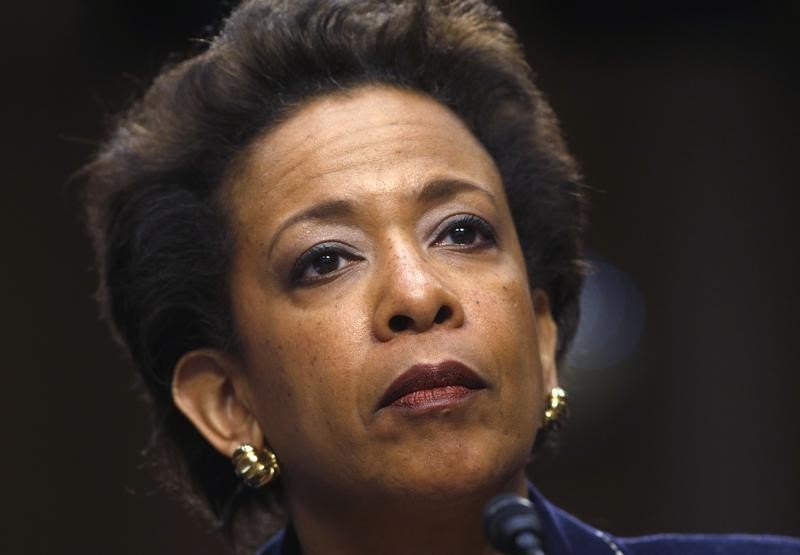By Lindsay Dunsmuir and Richard Cowan
WASHINGTON (Reuters) - Loretta Lynch won Senate approval as U.S. attorney general on Thursday, becoming the first black woman to occupy the post at a time when deadly altercations between white police and unarmed black men are making headlines.
The Senate confirmed Lynch by a vote of 56-43 to end a five-month partisan deadlock over her nomination by President Barack Obama. She had waited for a vote longer than the last seven attorneys general combined.
Obama said Lynch, the 55-year-old U.S. attorney for Brooklyn, New York, had credibility with both law enforcement and the communities they police.
He told supporters from his Organizing for Action political group that he would work with her to rebuild trust so that everyone felt safe and that the law was working on everyone's behalf.
Taking over the Justice Department from Attorney General Eric Holder, Lynch also will face early tests on financial cases alleging some of the world's largest banks helped clients evade U.S. taxes and manipulated currency markets.
She is expected to start work on Monday.
Ten Republicans voted for Lynch, including Senate Majority Leader Mitch McConnell. The tally in Lynch's favor was larger than expected, perhaps reflecting political concerns. Of the Republicans who backed her, four are up for reelection next year, three of them from states with big cities that have large African-American populations.
As attorney general she will likely be confronted with civil rights cases stemming from police altercations in several U.S. cities.
On Tuesday, the Justice Department said it was gathering information to determine whether it can bring civil rights charges in the death of a man who died after being arrested by Baltimore police.
Freddie Gray, a 27-year-old black man, was arrested by white officers on April 12 and died days later after slipping into a coma. A preliminary autopsy report said he died from a spinal injury.
IMMIGRATION AN ISSUE
The voting margin in the Senate reflected many Republicans' disapproval of Lynch's support for an executive order issued by Obama in November that was meant to shield millions of undocumented immigrants from the threat of deportation.
Before the vote, Alabama Republican Senator Jeff Sessions, an outspoken critic of Obama's executive action on immigration, blasted Lynch. "We do not have to confirm someone to the highest law enforcement position in America if that someone is publicly committed to denigrating Congress, violating law," he said.
Senate Democratic leader Harry Reid berated Republicans for delaying the confirmation and said Lynch was "as qualified a candidate" as he had seen in almost 30 years in the Senate.
Lynch's elderly father, Lorenzo, a retired Baptist minister from North Carolina, watched the vote from a visitors' gallery in the Senate chamber.
Lynch had awaited confirmation since November when Obama, a fellow Harvard Law School graduate, nominated her.
Despite the delay, she was widely seen as less controversial than Holder, who often clashed with Republicans. She has said she aims to smooth relations with Congress.
Her nomination was backed by the Senate's Judiciary Committee by a vote of 12-8 on Feb. 26. But her confirmation languished over an impasse in the Republican-led Senate on an unrelated bill meant to protect human trafficking victims.
Democrats had balked at an anti-abortion provision included in that bill, but that dispute was settled on Tuesday and the bill was approved on Wednesday.
An accomplished career prosecutor, Lynch has twice served as U.S. attorney in Brooklyn, most recently since 2010. Her office there handled more terrorism prosecutions than most other offices in the United States. For two years, she also led a committee that advised the attorney general on policy.

At a Senate confirmation hearing on Jan. 28, Lynch said her top priorities would include fighting terrorist threats and cyber crime, and improving relations between law enforcement and minority communities.
